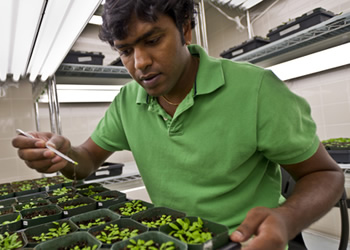
Vamsi Nalam, a doctoral candidate in the Department of Biological Sciences, always knew he was interested in plant biology since his undergraduate years. At UNT, his research involves studying the role of plant lipids/fatty acids in defense against plant pathogens and insect pests.
Nalam's work involves investigating the role of specific lipid metabolism genes, specifically 9-Lipoxygenases (9-LOX), in plant defense responses. He found that mutations in the 9-LOX gene renders the host plant more susceptible to the Green Peach Aphid, which is a serious pest on more than a 100 plant species. The 9-LOX gene is required for the activation of systemic acquired resistance (SAR), which is similar to the innate immune system in humans and animals.
Nalam's research also found that the same gene (9-LOX) is involved in plant defense response to a fungal pathogen, Fusarium graminearum that causes Head Blight in wheat. As part of the project, he has developed transgenic wheat plants that do not express the 9-LOX gene, which are being tested under field conditions. Nalam believes that studying the role of 9-LOX genes in plant lipid metabolism will provide a better understanding of plant interactions with pests and pathogens.
Nalam shares the lab with other students and post-docs in the Life Sciences Building. "I work on my own individual project in order to complete the research requirements for my dissertation, but also interact with other members in the lab on their projects." Nalam said.
Dr. Jyoti Shah is his mentor. Nalam joined Dr. Shah's lab at Kansas State University and moved with Dr. Shah's lab to take advantage of the new Life Sciences facility at UNT.
Nalam got his Bachelor of Science in Agriculture in India. He initially moved to the United States to pursue his Master's degree in Crop Science at Oregon State University.
"I wanted to broaden my experience and so chose to pursue a Ph.D. in the area of plant pathogen/insect interactions." Nalam said.
"I plan on pursuing a post-doctoral research position to continue my training as a plant molecular biologist." Nalam said. In the future, he hopes to return to his home country, India, to pursue a career in research and development in the area of plant pathogen/insect interactions.